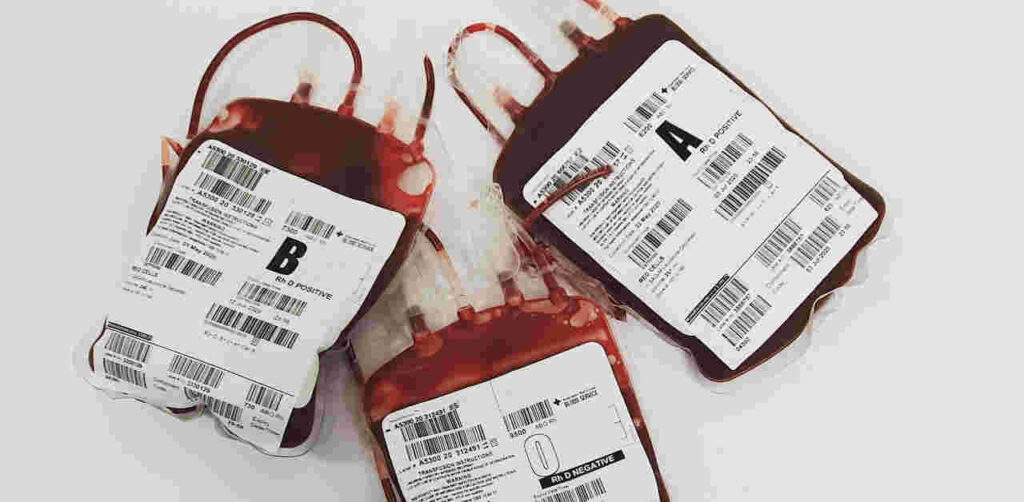Knowing your type could give clues to your risk of stroke and heart attack
Published by: AARP
There are compelling health reasons why you should know your blood type, especially when it comes to your heart. Research suggests that people with certain blood types — namely A and B — are at higher risk to develop blood clots and to have heart attacks and strokes.
Types of blood
Blood types are determined by the presence or absence of certain substances, called antigens, that can trigger an immune response if they are foreign to the body.
There are four main blood types: A, B, O, and AB, according to the American Red Cross. In addition to these antigens, there’s a protein called the Rh factor, which can either be present (+) or absent (-). That means there are eight blood subtypes: A+, A-, B+, B-, O+, O-, AB+, AB-.
Types A and B and blood clots
People with blood types A and B are at higher risk to develop blood clots compared with people who have type O blood, according to a 2020 study published in the American Heart Association journal Arteriosclerosis, Thrombosis, and Vascular Biology. The study, which looked at more than 400,000 people, found that types A and B were 50 percent more likely to develop blood clots in the legs called deep vein thrombosis and 47 percent more likely to develop a pulmonary embolism — when a clot travels to the lungs — than people with type O blood. They were 8 percent more likely to have a heart attack and 10 percent more likely to experience heart failure than type Os.
Why blood type affects clot risk
There are many possible reasons for why this happens, says Mary Cushman, M.D., a hematologist at the University of Vermont Medical Center and a professor of medicine and pathology at the Larner College of Medicine at UVM in Burlington, Vermont.
“The enzyme that controls blood type has other actions,” she explains. One of these is to modify a protein called von Willebrand factor, which is very important in forming blood clots. “The modifications to the protein are different in different blood types,” she says. “So people with type O blood have the lowest levels of von Willebrand factor on average and the lowest risk of abnormal clots. Type AB has the highest level and, in some studies, the highest risk of blood clots.”
There may also be some differences in platelets, the small cell fragments in the blood that form clots, says Joshua Beckman, a cardiologist at the UT Southwestern Medical Center. This may make you more susceptible to clotting.
Type A, type AB and cholesterol, stroke
There’s evidence to suggest that type A blood is linked to higher levels of low-density lipoprotein (LDL) cholesterol, the waxy substance that clogs arteries. Type AB blood is linked to inflammation, which may adversely affect blood vessels. Larger studies need to be done before coming to any definite conclusions, Beckman says.
Blood type may impact stroke risk, too. A 2022 study published in the medical journal Neurology reviewed 48 studies of 17,000 stroke patients and found that people with type A were 16 percent more likely to have an early stroke than people with other blood types, and those with type O were 12 percent less likely. An earlier study done by Cushman found that blood type AB, compared with O, had a 1.8 times higher risk of stroke; other blood types weren’t affected.
Blood type and other health risks
Scientists are studying how blood type might affect risks from the COVID-19 virus, but they say it’s too early to draw firm conclusions. Research has linked type O blood with a lower chance of getting seriously ill from cholera, and it may offer some protection from severe malaria.
What you can do
It’s important to keep research findings in context. Though certain blood types could mean an increased chance of health problems such as blood clots and stroke, the risk is relatively small compared with the dangers of smoking and high blood pressure, and blood type doesn’t tell you much about your personal risk, Cushman points out.
You also shouldn’t let your blood type give you a false sense of security. If you’re having surgery or if you have cancer — both situations that can raise the risk of blood clots — Cushman recommends that you talk to your healthcare provider about a blood clot prevention plan. “If you have an O blood type, you may have a slightly lower risk of some diseases like thrombosis, but it doesn’t completely protect you from the risk,” she says. Thrombosis occurs when clots block blood vessels.
Knowing your blood type may give you added insight into your heart health, Salazar says. Though doctors often talk about manageable risk factors, such as high blood pressure, diabetes, and smoking, there’s less conversation around genes or the genetic risk for heart disease, he says. Having a patient’s blood type is a “way to try to narrow down individuals who may be at high risk,” he says. For these people, following the American Heart Association’s Life’s Essential 8 — eating right, staying active, not smoking, getting enough sleep, managing weight, controlling cholesterol, managing blood sugar, and managing blood pressure — may be even more important.
Regardless of your blood type, everyone should have a heart-healthy lifestyle, Cushman says. “Following the guidance of the American Heart Association’s Life’s Essential 8, for example, will add years to your life and reduce your risk of thrombosis-related outcomes like heart attack, stroke, and venous thrombosis,” she says.
